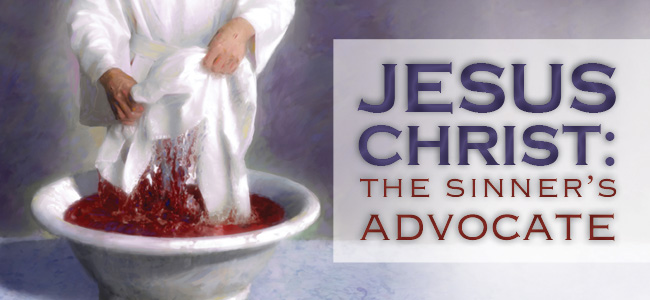July-September

Before the world began, and by virtue of the sacrifice of Christ on behalf of sinners, God made Him a Mediator between God and the human race.
“The Lord hath sworn, and will not repent, Thou art a priest for ever after the order of Melchizedek” (Psalm 110:4).
This is why in Genesis, as soon as Adam and Eve sinned, we see the Lord searching for them. An Advocate had already been appointed for such a crisis.
“And [Adam and Eve] heard the voice of the Lord God walking in the garden in the cool of the day: and Adam and his wife hid themselves from the presence of the Lord God amongst the trees of the garden. And the Lord God called unto Adam, and said unto him, Where art thou?” (Genesis 3:8, 9).
“Where art thou?” Did God know where Adam and Eve were? Of course He did. I hear immense pity in the tones of this question. I don’t hear a condemnatory tone in it. I hear sympathy, I hear love, I hear the tact that is born of divine love. I hear immense gentleness expressed towards a man and a woman trembling under the fear of guilt. I hear an Advocate speaking. I hear One that draws near to help in time of need.
As we follow the dialogue between God, Adam and his wife, we see that before a curse was ever pronounced upon them, God promised to deliver them from the power of sin. “I will put enmity between thee and the woman, and between thy seed and her seed” (Genesis 3:15). This is an Advocate speaking. This is someone restoring a broken relationship. This is someone making “at-one-ment,” to be “one” again.
So this is why we needed an atonement.
Why was Jesus alone qualified to be our Advocate and High Priest in the atonement? There are two qualifying points we should consider here:
CHRIST'S HUMANITY AND HIS SACRIFICE and CHRIST'S TEMPTATIONS AND SUFFERINGS
As we read the following verses, you’ll see that Jesus was qualified to be our High Priest because He became one of us—and as one of us, He offered Himself up as a sacrifice for sin.
“Wherefore when he cometh into the world, he saith, Sacrifice and offering thou wouldest not, but a body hast thou prepared me: In burnt offerings and sacrifices for sin thou hast had no pleasure. Then said I, Lo, I come (in the volume of the book it is written of me,) to do thy will, O God. Above when he said, Sacrifice and offering and burnt offerings and offering for sin thou wouldest not, neither hadst pleasure therein; which are offered by the law; Then said he, Lo, I come to do thy will, O God. [In Gethsemane, Christ prayed, “Not as I will, but as thou wilt” Matthew 26:39]. He taketh away the first, that he may establish the second. By the which will we are sanctified through the offering of the body of Jesus Christ once for all. And every priest standeth daily ministering and offering oftentimes the same sacrifices, which can never take away sins: But this man, after he had offered one sacrifice for sins for ever, sat down on the right hand of God” (Hebrews 10:5–12).
You see, it was the will of God that Christ should be made a sacrifice for sin, and this qualified Jesus to be our High Priest and Advocate. He became human to offer up Himself as the Lamb of God and in His office of High Priest, He is presenting the merits of His own sacrifice.
He was “the Lamb slain from the foundation of the world” (Revelation 13:8). Not in reality before the cross, but in pledged form was He slain before the cross. But a pledge of God is as good as real, for God cannot lie. It was necessary for Christ only to die once for all time, and it was as though He had died always to sin since the foundation of the world. His death on the cross is just as real today as it was 2,000 years ago upon the hills of Golgotha—for John saw “in the midst of the throne . . . stood a Lamb as it had been slain” (Revelation 5:6). For this reason, Christ can be our Advocate.
“Nor yet that he should offer himself often, as the high priest entereth into the holy place every year with blood of others; for then must he often have suffered since the foundation of the world: but now once in the end of the world hath he appeared to put away sin by the sacrifice of himself” (Hebrews 9:25, 26).
The other reason Christ could be our Advocate is because of His temptations and sufferings while He lived upon the earth. This qualified Him to be merciful and compassionate with sinners and at the same time remain faithful in things pertaining to God.
“Wherefore in all things it behoved him to be made like unto his brethren, that he might be a merciful and faithful high priest in things pertaining to God, to make reconciliation for the sins of the people. For in that he himself hath suffered being tempted, he is able to succour them that are tempted” (Hebrews 2:17, 18). Amen!